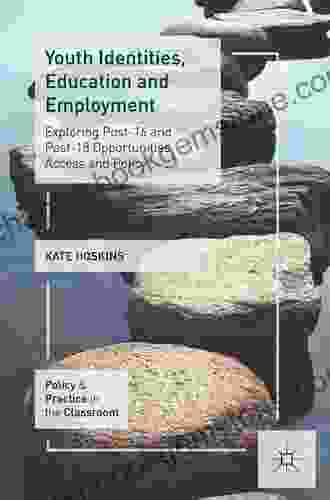The transition from compulsory education to post-compulsory education and training is a critical stage in young people's lives. For many, this is a time of great change and opportunity. They may be moving away from home for the first time, starting a new course of study, or entering the workforce.
For some young people, however, this transition can be more challenging. They may face barriers to accessing post-compulsory education and training, such as a lack of financial resources, academic qualifications, or support from family and friends.
4.4 out of 5
| Language | : | English |
| File size | : | 951 KB |
| Text-to-Speech | : | Enabled |
| Screen Reader | : | Supported |
| Enhanced typesetting | : | Enabled |
| Word Wise | : | Enabled |
| Print length | : | 216 pages |
This article explores the post-16 and post-18 opportunities available to young people in England. It also discusses the policies and practices that are in place to support young people's access to these opportunities.
Post-16 Opportunities
There are a wide range of post-16 opportunities available to young people in England. These include:
* A-levels: A-levels are academic qualifications that are typically taken over two years. They are equivalent to the first year of university study. * Vocational qualifications: Vocational qualifications are designed to provide students with the skills and knowledge they need to enter a specific trade or profession. They can be taken at different levels, from Level 1 to Level 3. * Apprenticeships: Apprenticeships combine paid work with study. They allow young people to gain the skills and experience they need to enter a specific trade or profession. * Traineeships: Traineeships are short-term work placements that allow young people to gain experience in a specific industry.
Post-18 Opportunities
There are also a wide range of post-18 opportunities available to young people in England. These include:
* University: University is a traditional path to higher education. Students can study a wide range of subjects and earn degrees at different levels, from bachelor's degrees to doctorates. * Further education: Further education colleges offer a wide range of courses, from vocational qualifications to university-level courses. * Higher apprenticeships: Higher apprenticeships are designed to provide young people with the skills and experience they need to enter a specific profession. They typically combine paid work with study and lead to a higher education qualification, such as a foundation degree or a bachelor's degree.
Access to Post-Compulsory Education and Training
The government has a number of policies in place to support young people's access to post-compulsory education and training. These include:
* The Education and Skills Funding Agency (ESFA): The ESFA is responsible for funding post-compulsory education and training in England. It provides funding to schools, colleges, and universities. * The National Careers Service: The National Careers Service provides free careers advice and guidance to young people. It can help young people to identify their career options and to find the right course or training program. * The Apprenticeships and Traineeships Programme: The Apprenticeships and Traineeships Programme provides funding for apprenticeships and traineeships. It aims to help young people to gain the skills and experience they need to enter the workforce.
Policy and Analysis
There has been much debate about the effectiveness of the government's policies to support young people's access to post-compulsory education and training. Some critics have argued that these policies are not ng enough to help disadvantaged young people.
For example, a report by the Education Policy Institute found that young people from disadvantaged backgrounds are less likely to participate in post-compulsory education and training than their more advantaged peers. The report also found that young people from disadvantaged backgrounds are more likely to drop out of post-compulsory education and training.
The government has defended its policies, arguing that they are making a positive difference. For example, the government has pointed to the increase in the number of young people participating in apprenticeships and traineeships.
The debate about the effectiveness of the government's policies is likely to continue. However, there is no doubt that the government has a key role to play in ensuring that all young people have the opportunity to succeed in post-compulsory education and training.
The transition from compulsory education to post-compulsory education and training is a critical stage in young people's lives. It is a time of great change and opportunity, but it can also be a time of challenge.
The government has a number of policies in place to support young people's access to post-compulsory education and training. However, there is still more that can be done to help disadvantaged young people.
By working together, we can ensure that all young people have the opportunity to succeed in post-compulsory education and training and to reach their full potential.






















































































































































































































































































































































































































































































































































